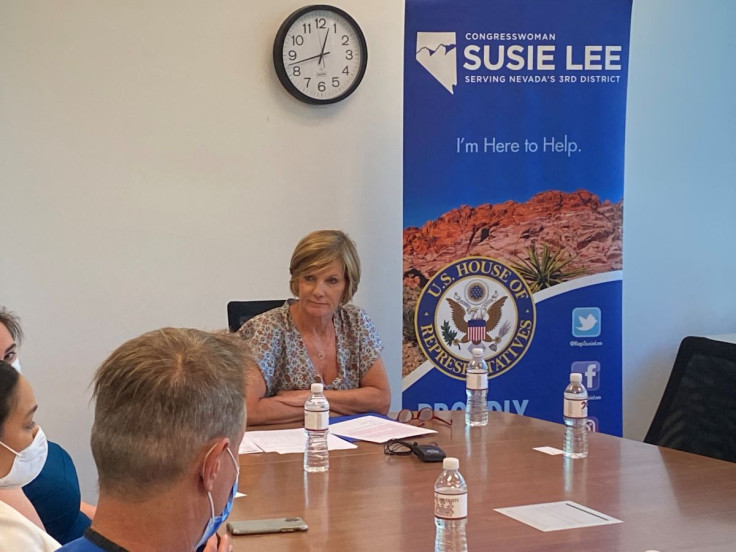'The Supreme Court Did Us A Favor': Democrats Seize On Abortion Ruling As Midterm Lifeline

Susie Lee, one of the U.S. Congress's most endangered Democrats, has spent this year fighting a tough re-election campaign in the face of soaring inflation and weighed down by President Joe Biden's dismal approval numbers.
Then on June 24, the U.S. Supreme Court threw a potential lifeline to the Nevada congresswoman as she seeks a third term in this November's midterm elections: the justices ended federal abortion rights by overturning the landmark 1973 Roe-v-Wade decision.
Within 24 hours, armed with an issue she hopes will galvanize voters and reverse a disastrous-looking election year for Democrats, Lee launched the first ad of her campaign - a $500,000 TV and digital attack on her pro-life Republican opponent on the issue of abortion rights.
"We have a stark choice in the race for Congress," the ad declares.
Lee, like dozens of fellow endangered Democratic incumbents across the United States, is refocusing much of her campaign on abortion rights, hoping the Supreme Court's decision can help win back suburban voters who have soured on her party because of high food and gas prices and an unpopular president.
Frustrated with what they see as weak messaging by national party leaders on Biden's policy achievements, some Democratic foot soldiers say the overturning of Roe-v-Wade has thrown them a political lifeline, a foot in the door of voters otherwise disinclined to listen to them because of high inflation.
Party strategists and analysts warn, however, that the issue of abortion rights will likely not be enough to save Democrats from losing control of the U.S. House of Representatives, and possibly the Senate too.
Brian Stryker, a Democratic pollster, said that while there has been a shift of about three percentage points in national opinion surveys toward Democrats since the court's ruling, "inflation is still far and away voters' top concern."
Kyle Kondik, a non-partisan political analyst at the University of Virginia Center for Politics, said he understood why Democrats had moved quickly to focus on abortion rights, "but it's not clear to me it's moving the needle a ton."
Lee's district encompasses parts of suburban Las Vegas, in a state with one of the highest inflation rates in the country at 14.9 percent. Lee has spent months confronting the issue in her swing district, frequently urging her party's leaders in Congress to do more to ease supply chain problems and lower food and gas prices.
But, now she is focusing on abortion as much as the economy because "as a woman I believe this an issue that will galvanize women," she told Reuters.
April Becker, Lee's Republican opponent, said in an interview that Democrats like Lee were using abortion as a way to "distract" voters from their most pressing concerns: the cost of food and gas.
"I don't blame her for trying to change the subject," said Becker, who opposes abortion except in the cases of rape, incest and if the mother's life is in danger.
She said she has no plans to try to overturn abortion rights enshrined in Nevada under a 1990 referendum, and said she does not support a federal abortion ban, which many Republicans in Congress support.
PHONE BANKS, TEXT CAMPAIGNS
Democratic volunteers, activists and women's rights groups in Lee's district say the Supreme Court's decision has energized them as they try to stop a Republican blowout this November.
Local Democratic clubs in the Las Vegas area have seen a surge in membership, club leaders told Reuters. Deidre Radford, co-president of the Red Rock Democratic Club, said friends normally uninterested in politics have contacted her asking to work on phone banks and text campaigns for Lee and other Democrats.
Radford is holding a "Roe, Roe, Roe Your Vote" event on July 27, and membership of her club has increased from about 150 to nearly 190 because of the abortion issue, she said.
A rally to protest the ruling on the day it was announced was organized in just three hours, rather than the weeks it usually takes such protests, said Sue Burtch, co-executive director of the Nevada National Organization for Women.
"The Supreme Court did us a favor and gave us a talking point," Burtch said.
Often voters are so allergic to partisan politics they don't want to engage, but the ending of federal abortion rights cuts through that. It gave volunteers on the ground an opening to approach voters with a real-world event that could impact their families, Burtch said.
Some activists interviewed expressed frustration with Democratic leaders over the Supreme Court ruling, saying they have been too timid on the issue in the face of Republican assaults on abortion rights.
"Democratic messaging has been all over the place. It's been soft. Republicans are really good at messaging," Burtch said.
Lee bristled when asked about the frustration expressed by Burtch and other activists.
"They should be pissed off at Republicans," she said.
Some of the eight on-the-ground Democrat workers and abortion activists who talked to Reuters conceded that surging inflation is still a big problem for Democrats, and that the abortion issue may not be enough keep Congress in Democrats' hands.
"Everyone feels the pinch at the gas pump, the bite every time you go to the grocery store," said Lani Paz, head of the Southwest Democratic Club.
© Copyright Thomson Reuters 2024. All rights reserved.





















